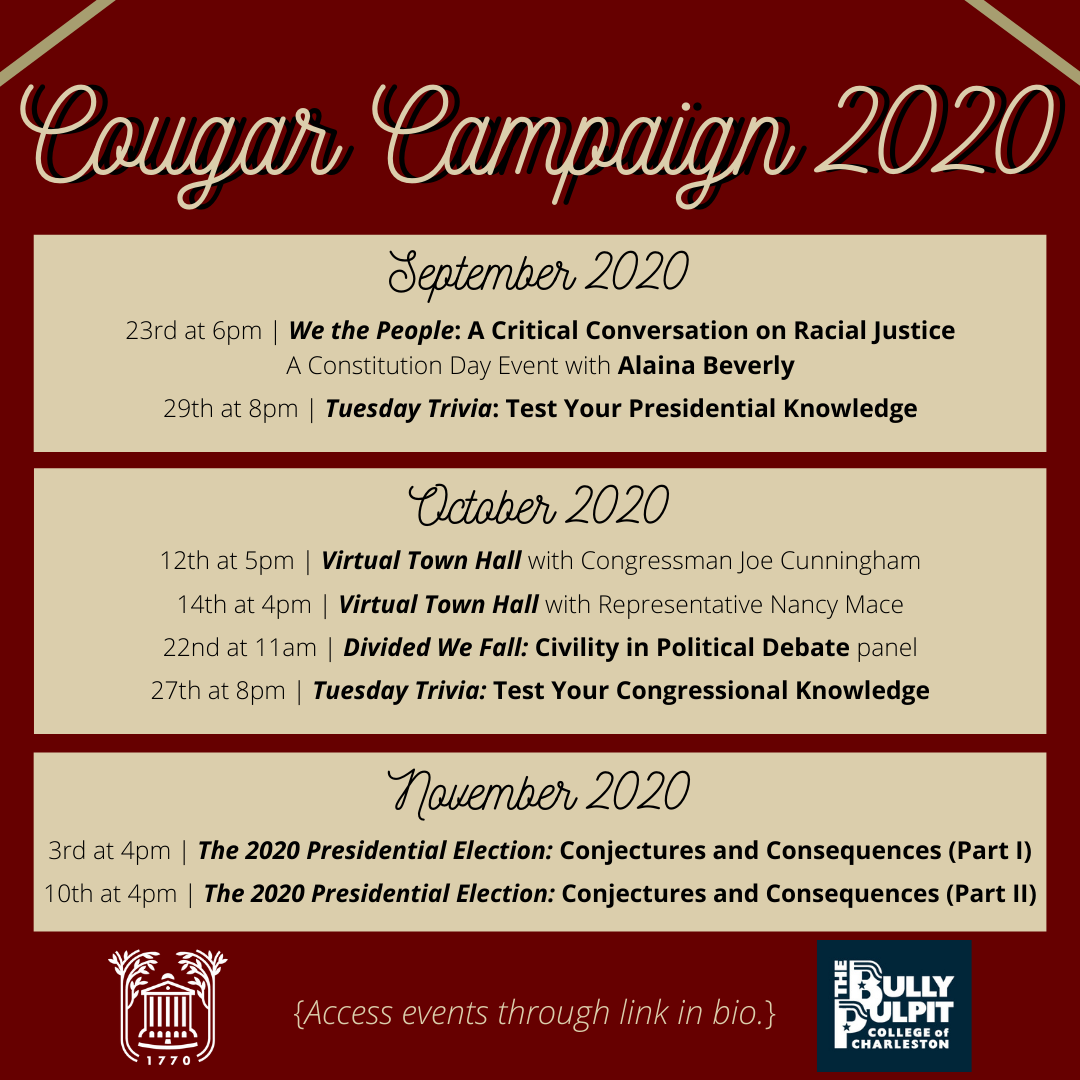Navigating a Contentious Election Cycle through Dialogue
Recent events locally, nationally and globally are affecting all of us, and we need safe places where we can both process our own thoughts and feelings and discuss effective ways to initiate and engage in “critical conversations.” Specific to this historic moment, we need formal and informal spaces in which to dialogue about the current election cycle, which is uniquely critical as it is happening simultaneously with a global pandemic, a deepening economic recession, devastating impacts of climate change, and social unrest in response to systemic racism and violent oppression of BIPOC (Black, Indigenous, People of Color) family, friends and community members. We have some general advice for organizing these conversations, and also resources to explore in preparation for them.
» Download a PDF copy of "Navigating a Contentious Election Cycle through Dialogue."
» View CofC Mental Health Education's Post-Election Stress Guide
General advice for facilitating difficult conversations
- Determine what the space you are creating or facilitating is designed to accomplish. Is it a space for venting or grieving or celebrating; a space for debating ideas; a space to find like-minded others? Students need to know what they are walking into. Reflect on your own motivations for leading such dialogues.
- Collectively create shared agreements about the conversation. It is helpful to have a few “non-negotiable” statements with which to start. For example, listening to understand, not to respond; refraining from interruptions or outbursts; disagreeing with the ideas not the person. The National Coalition for Dialogue and Deliberation has a resource on setting community agreements.
- Have a partner or co-facilitator that can address conflict if it arises, or attend to a student in distress, or offer a different viewpoint than yours. This partner will be additionally helpful to debrief with.
- Recognize and be prepared for risks and vulnerability required of everyone to engage thoughtfully in such dialogues. Prepare for possible harms that can surface during these conversations. Anticipate disagreement and plan to address harmful tensions through restorative justice practices. (see Additional Resources below).
Specific advice about this election cycle
- Be a voice of reason and historical context. This election is indeed important. Every other election has been too (has there ever been an election cycle that was unimportant?). Students may feel apocalyptic about what may happen. They need reassurance that the democratic system is resilient and there will always be ways to advocate for positions that are important to them.
- Normalize the stress and anxiety around the issues. We all are feeling this. Point students to campus supports and resources that are intended for them to utilize.
- CofC Counseling: https://counseling.cofc.edu/index.php
- Therapy Assistance Online: https://us.taoconnect.org/register
- Treatment & Support groups & wellbeing series: https://counseling.cofc.edu/groups/index.php
- A treasure of resources is maintained by Prof. Heath Hoffman (Sociology) online: https://sites.google.com/cofc.edu/self-care-hoffmann/home
- Don’t normalize ideological polarization. Name this as a strategy used to divide us.
- Hold space for students to discuss internal conflicts related to the impact of parental and family influences on electoral politics. Students may feel tension around needing to defend or reject their parents’ views.
Resources for dialogues around the election
- Campus Elect, Faculty Resource: Talking About Elections in Your Classroom
- Facing History and Ourselves has a number of Teaching Resources for the 2020 US Election.
- The Bully Pulpit Series is hosting two faculty forums about the election: November 3 @ 4pm (Zoom, https://bit.ly/33BThmT) and November 10 @ 4pm (Zoom, https://bit.ly/33BThmT).
- Resources provided by the Chronicle of Higher Education , “Teaching” newsletter, 10/22/2020:
- The Center for Research on Learning and Teaching and the Edward Ginsberg Center at the University of Michigan have put together a guide for faculty members, Preparing to Teach About the 2020 Election and After.
- Debra Mashek, former executive director of the Heterodox Academy, wrote an essay for Inside Higher Ed on how colleges can avoid post-election student unrest.
- Princeton University is co-sponsoring a virtual event on November 20, The 2020 Elections: What Happened and Why?
Additional Resources
- Difficult Dialogues National Resource Center
- University of Alaska Anchorage Engaging Difficult Dialogues in Higher Education
- Develop Restorative Justices practices for College Students About Restorative Justice - School of Leadership and Education Sciences
Developed by Kristi “kaj” Brian (Women's and Gender Studies program and Gender and Sexuality Equity Center), Kris De Welde (Women's and Gender Studies program) and Gibbs Knotts (Political Science Department and the School of Humanities and Social Sciences)
Cougar Campaign 2020
The Cougar Campaign 2020 hosted by the Bully Pulpit at the College of Charleston encourages and facilitates political participation throughout the campus community by providing a platform for dialogue with our nation’s leaders. Through town hall events with political candidates, voter registration drives, student debates, hosted media events, unique campus service opportunities, and relevant independent study experiences, The Bully Pulpit Series reinforces the message that the growth of our country is backed and guided by the process of citizen interest and involvement.

October 14 @ 4pm Virtual Town Hall with Representative Nancy Mace
October 22 @ 11am Divided We Fall: Civility in Political Debate Learn more here.
October 27 @ 8pm Tuesday Trivia: Test Your Congressional Knowledge
November 3 @ 4pm The 2020 Presidential Election: Conjectures and Consequences (Part I)
November 10 @ 4pm The 2020 Presidential Election: Conjectures and Consequences (Part II)
Additional Support and Channels to Report
In addition, the College’s Employee Assistance Program provides online resources for helping employees cope with stress related to the election and waiting on results (see email or contact HR for your username and password).
Now, with the election over and the results being finalized, we must remain committed to the College of Charleston’s Code of Conduct and our Campus Values. That means that we treat all members of our community with kindness and respect. If you find that is not the case, we encourage you to reach out to our Cougar Inclusion Team to report incidents of bias or exclusion.






